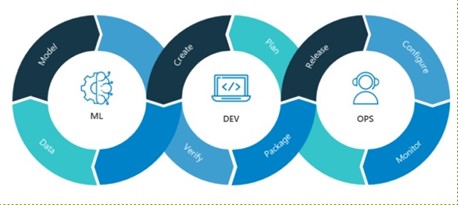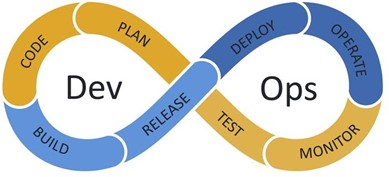Optimizing the Future: MLOps vs DevOps in the Industrial Revolution
By Neha Purohit, Vice President, Data and Analytics, United Talent Agency
Introduction
Two paradigms are leading this change in an era where industry and technology have combined to create previously unheard-of growth and innovation: MLOps and DevOps. The differentiation and convergence of these techniques serve as the cornerstone for upcoming breakthroughs as we manage the complexity of the Industrial Revolution.
They go beyond simple operational tactics. This article thoroughly explores the differences between MLOps and DevOps, highlighting their distinct functions, complementary qualities, and future industrial landscape-altering effects.
The Evolution of Industrial Practices
From DevOps to MLOps: A Historical Context
There has been an interesting transition from conventional software development processes to today’s sophisticated, data-driven methodologies. The capacity of DevOps, a technique that unifies software development (Dev) and IT operations (Ops), to reduce the systems development life cycle and enable continuous delivery of high-quality software has long been praised. MLOps, which applies DevOps ideas to machine learning, was created as machine learning (ML) became a key driver of technological innovation. Its goal is to ensure that ML models are not only generated but also effectively deployed and maintained in production situations.
The Fourth Industrial Revolution’s Effects
MLOps and DevOps are thriving because of the Fourth Industrial Revolution, which is defined by a merging of technologies, making it harder to distinguish between the digital, biological, and physical domains. Their responsibilities in this regard go beyond simple efficiency; they involve inventing novel approaches to value creation and data-driven global knowledge.
In the changing environment of the Industrial Revolution, MLOps and DevOps are foundations of innovation and efficiency.
Understanding MLOps Definition and Key Components

The goal of MLOps, or Machine Learning Operations, is to effectively and reliably deploy and maintain machine learning models in production. The essential elements of MLOps are model creation, data management, model training, validation, deployment, monitoring, and lifecycle management. By adopting MLOps, industries may use machine learning models to improve decision-making, stimulate innovation, and simplify operations.
How MLOps is Changing the Industrial Scene
From case studies and real-world implementations, it is clear that MLOps is transforming businesses by facilitating more data-driven and flexible decision-making. MLOps plays a vital role in turning theoretical data models into practical applications, ranging from tailored customer experiences in retail to predictive maintenance in manufacturing.
Comprehending DevOps Definition and Fundamental Ideas
In order to enhance the workflow between software developers and IT operations specialists, the DevOps movement emphasizes automation, integration, communication, and teamwork. This revolutionary method is based on the fundamental DevOps tenets of Culture, Automation, Lean, Measurement, and Sharing (CALMS).

Industrial Innovation Acceleration with DevOps
Industrial innovation has largely accelerated thanks to DevOps, which enables quicker development cycles, more frequent deployments, and more dependable releases that align with corporate goals. This flexibility is essential in the fast-paced market of today, when an industry leader’s ability to seize chances quickly may make or break them.
Comparative Analysis: MLOps vs. DevOps Key Similarities and Differences
Although MLOps and DevOps use similar concepts—automation, continuous integration, and continuous delivery—the extent and intricacy of their applications vary. MLOps explicitly addresses the subtleties of machine learning models by adding a layer of complexity through data versioning, model validation, and lifecycle management.
Case Studies: Practical Implementations in the Sector
The revolutionary potential of MLOps and DevOps is demonstrated via case studies illustrating their practical implementations. For instance, MLOps has made it possible to design and implement predictive models for patient care, greatly improving the caliber and responsiveness of healthcare services, while DevOps approaches have expedited software development for patient management systems.
MLOps vs. DevOps: A Direct Comparison
MLOps has characteristics similar to those of the DevOps methodology. While DevOps uses a speedy, iterative method to deliver apps, MLOps applies the same ideas to put machine learning models into production.
| Steps and Skill Requirements | MLOps | DevOps |
| Team Skills | Data Engineers, Data Scientists, Machine Learning Engineers, Software Developers, QA, and IT Administrators. | Software Developers, Data Engineers, Database Administrators, Quality Assurance Professionals, IT Administrators. |
| Development | Experiment with additional data attributes and models to determine optimal performance. | Develop new features for the applications or fix existing bugs. |
| Testing | Validate data, evaluate models, and perform unit and integration tests on application code. | Unit and Integration Tests in a sandbox environment to capture any remaining bugs. |
| Deployment | Deploying newly trained models, maintaining data pipelines, and retraining routines. | Packaging the code, configurations, as well as dependencies, and then deploying them on production servers. |
| Production | Machine learning models are monitored for model drifts. | Applications and production environment are monitored for errors and bugs |
Combining DevOps with MLOps for Optimal Efficiency
MLOps and DevOps approaches combined can result in previously unheard-of levels of productivity and creativity. Through standardizing these approaches, sectors may take advantage of each other’s advantages to expedite the lifetime of
both machine learning and software models, from creation to implementation and beyond. This integration promotes a culture of innovation and continual improvement in addition to streamlining processes.
Prospective Patterns and Forecasts
How Emerging Technologies Are Changing DevOps and MLOps
Future developments in artificial intelligence (AI), the Internet of Things (IoT), and quantum computing will likely have a greater impact on how MLOps and DevOps develop. These technologies have the potential to revolutionize industry operations and foster innovation by bringing in unprecedented levels of automation, accuracy, and efficiency.
Forecasts for Industrial Operations in the Future
It is evident how industrial processes are going: they are becoming more automated, intelligent, and interconnected. In the future, MLOps and DevOps will be essential not only as operational techniques but also as engines of innovation and expansion. The collaboration between MLOps and DevOps will be essential to realizing the full potential of the Fourth Industrial Revolution as industries continue to change.
Conclusion
In the changing environment of the Industrial Revolution, MLOps and DevOps are foundations of innovation and efficiency. They are influencing the future of industrial operations with their unique but complementary skills, generating improvements that are not only revolutionary but also critical to the long-term prosperity of industries throughout the world. As we face the difficulties and prospects of the new era, the combination of MLOps and DevOps methods will certainly be critical to success.

